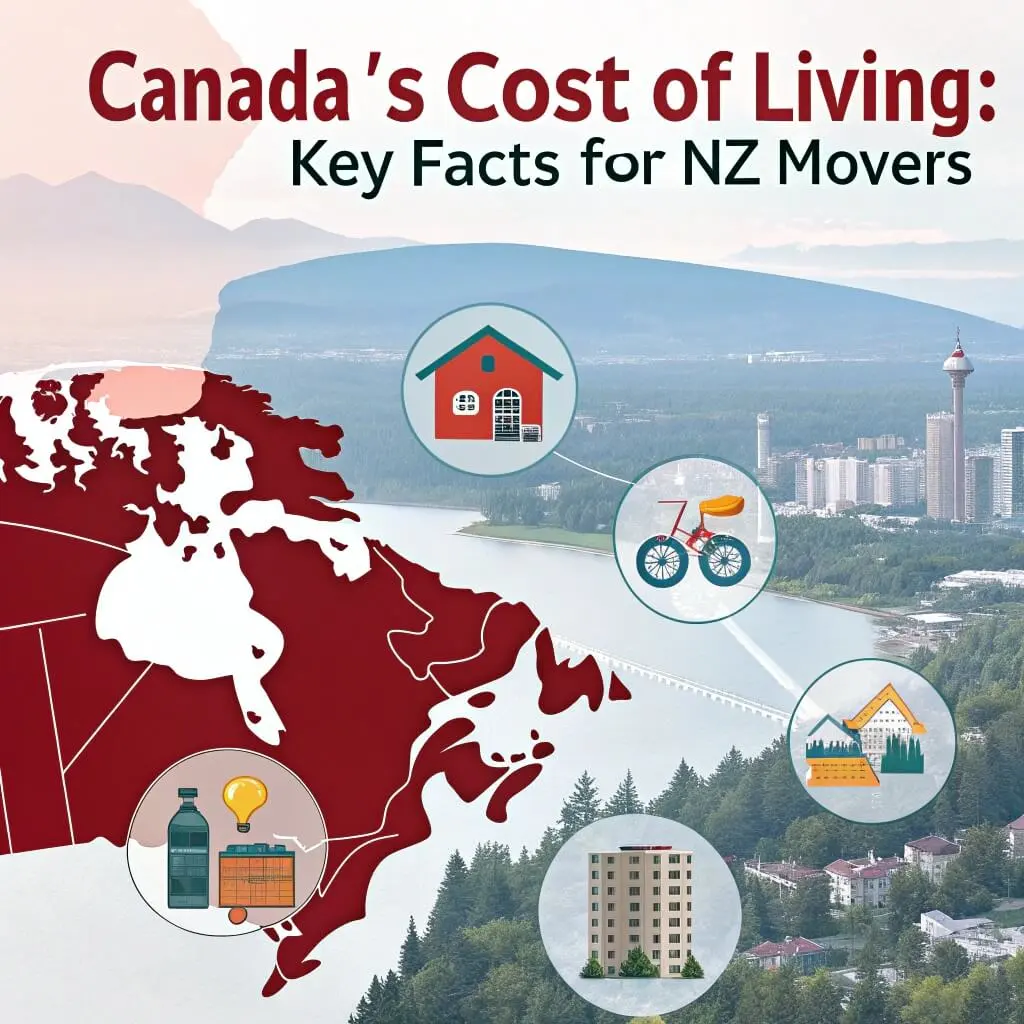Moving overseas is a major life decision, and for many Kiwis, Canada is an appealing destination. With its high quality of life, excellent healthcare and education systems, and welcoming culture, it’s no surprise that more New Zealanders are considering the switch. But before you start packing, understanding the cost of living in Canada is key to avoiding surprises and ensuring your move goes smoothly.
What to expect when it comes to housing
Housing is often the biggest monthly cost for newcomers to Canada, especially in major cities like Toronto and Vancouver, where a one-bedroom apartment in the city centre can cost between CAD 2,300 and CAD 2,800 (NZD 2,760–3,360).
More affordable options are found in smaller cities such as Winnipeg or Halifax, where similar accommodation may range from CAD 1,700 to CAD 2,000 (NZD 2,040–2,400).
Most landlords in Canada do not include utilities in the rent, so you’ll need to budget separately for heating, electricity, and water — all essential services, especially during the colder months.
Overall, Canadians typically spend 35% to 50% of their income on housing and related costs, which may also include mortgage repayments, power, and basic services like telephone or internet. It’s important to account for these expenses early, as they can add significantly to your monthly outgoings.
Food and groceries can add up
Groceries in Canada can be more expensive than what you’re used to in New Zealand, especially during the winter months when much of the fresh produce is imported. A weekly shop for two adults might cost between CAD 150 and CAD 250 (NZD 180–300), depending on where you live and what you buy.
Items like milk, cheese, and eggs tend to be pricier in Canada, while packaged goods and frozen items are often similar in cost. Shopping at discount supermarkets and making use of local farmers’ markets when in season can help reduce your grocery bill.
Getting around in your new city
Public transport is reliable in major Canadian cities, with monthly transit passes ranging from CAD 100 to CAD 160 (NZD 120–192). However, many areas outside central hubs rely heavily on cars, so you may need to buy a vehicle.
While petrol is generally cheaper than in New Zealand, car insurance in Canada is notably higher, especially for new arrivals who lack a Canadian driving history. Be sure to factor this into your ongoing costs if you’re planning to drive.
Healthcare isn’t entirely free
Canada’s healthcare system is publicly funded, but new residents often face a waiting period before coverage kicks in, usually up to three months, depending on the province. During this time, you’ll need private insurance.
It’s also worth noting that prescriptions, dental care, and other health services may not be fully covered by public health plans. Many locals choose to top up with employer-provided or private policies to help cover these additional expenses.
Schooling and education costs
Public education in Canada is free and widely regarded as high quality. However, private schools do exist and can cost anywhere from CAD 15,000 to over CAD 30,000 (NZD 18,000–36,000) per year.
For those pursuing tertiary education, tuition fees are generally higher than in New Zealand, especially for international students or recent arrivals who do not yet qualify for local rates.
Costs to Prepare for When Making the Move
One of the most important parts of preparing to relocate is understanding your immediate financial commitments. If you’re moving to Canada from NZ. Here’s what to know about the kinds of expenses involved in getting started. The checklist below will help you plan your budget.
- Immigration and application fees
- Flights and airport transport
- Short-term housing or hotel stays
- First and last month’s rent, plus security deposit
- Basic household essentials (bedding, cookware, cleaning supplies)
- Initial groceries and daily necessities
- Public transport passes or vehicle expenses
- Mobile phone setup and internet services
- Medical insurance for the waiting period
- Emergency savings for unexpected needs
Having a clear financial plan can make a significant difference in how smoothly you settle into life in Canada.
Settling in with Confidence
Canada offers a lot to love — from its natural beauty and safety to the strong public services and high standard of living. But as with any international move, the cost of living can differ greatly from what you’re used to in New Zealand. Taking the time to understand these differences now will help you settle in with greater peace of mind and fewer financial shocks.
